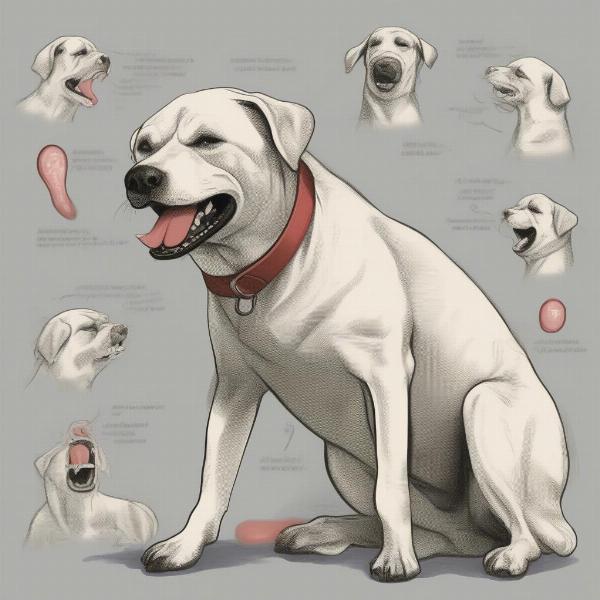Albuterol toxicity in dogs is a serious concern for pet owners. This medication, commonly used to treat asthma and other respiratory conditions in humans, can have potentially life-threatening effects on our canine companions. Understanding the risks, symptoms, and treatment options associated with albuterol toxicity is crucial for responsible dog ownership. This guide provides a comprehensive overview of albuterol toxicity in dogs, empowering you to protect your furry friend.
Albuterol, also known as salbutamol, works by relaxing the muscles in the airways, making it easier to breathe. While beneficial for humans, this same mechanism can cause dangerous complications in dogs. Even small amounts of albuterol can be toxic, leading to a range of symptoms, from mild tremors to severe cardiovascular issues. Therefore, it’s imperative to keep all albuterol-containing products, including inhalers, tablets, and syrups, safely out of reach of your dog.
Recognizing the Signs of Albuterol Toxicity
Early detection of albuterol toxicity is crucial for effective treatment. If you suspect your dog has ingested albuterol, look out for these common symptoms:
- Rapid heart rate: One of the most prominent signs is a significantly elevated heart rate.
- Tremors or shaking: Muscle tremors, ranging from mild twitching to severe shaking, can occur.
- Restlessness and agitation: Your dog may appear unusually restless, anxious, or agitated.
- Panting and difficulty breathing: Albuterol can paradoxically worsen breathing problems in dogs.
- Weakness and lethargy: As toxicity progresses, weakness and lethargy can set in.
- Vomiting and diarrhea: Gastrointestinal upset can also be a symptom.
- Changes in potassium levels: This requires blood work to diagnose.
 Dog showing symptoms of albuterol toxicity
Dog showing symptoms of albuterol toxicity
What to Do If Your Dog Ingests Albuterol
If you suspect your dog has ingested albuterol, immediate veterinary attention is critical. Contact your veterinarian or the nearest emergency animal hospital right away. Time is of the essence in these situations. The veterinarian may induce vomiting to remove the medication from the system or administer activated charcoal to absorb the toxin. Supportive care, such as intravenous fluids and medications to manage heart rate and potassium levels, may also be necessary.
Preventing Albuterol Toxicity
Prevention is always better than cure. Here are some essential steps to prevent albuterol toxicity in your dog:
- Secure all medications: Keep all human medications, including albuterol inhalers, tablets, and syrups, safely stored out of your dog’s reach. Consider using childproof containers and storing medications in locked cabinets.
- Be mindful of dropped pills: If you accidentally drop an albuterol pill, pick it up immediately. Dogs have a keen sense of smell and may be attracted to the scent.
- Educate family members: Ensure all members of your household understand the risks of albuterol toxicity and the importance of keeping medications secure.
- Never administer albuterol to your dog without veterinary guidance: Albuterol is not safe for dogs unless specifically prescribed by a veterinarian.
Long-Term Effects of Albuterol Toxicity
While most dogs recover fully with prompt treatment, some may experience long-term health issues, especially if the toxicity was severe. These may include:
- Heart problems: Persistent heart rhythm abnormalities or weakened heart muscle.
- Respiratory issues: Chronic breathing difficulties or increased susceptibility to respiratory infections.
Understanding the Severity of Albuterol Toxicity
The severity of albuterol toxicity varies depending on several factors, including the amount ingested, the dog’s size and overall health, and the time elapsed since ingestion. Early intervention significantly improves the prognosis.
Dr. Emily Carter, DVM, a board-certified veterinary toxicologist, advises, “Albuterol toxicity can escalate quickly. Every minute counts. If you suspect your dog has ingested albuterol, don’t hesitate to seek immediate veterinary care. Early intervention is key to a successful outcome.”
Conclusion
Albuterol toxicity in dogs is a serious but preventable condition. By understanding the risks, recognizing the symptoms, and taking proactive steps to secure medications, you can protect your furry companion. Remember, immediate veterinary attention is crucial if you suspect your dog has ingested albuterol.
FAQ
-
What is the most common sign of albuterol toxicity in dogs? A: A rapid heart rate is often the most noticeable sign.
-
Can a small amount of albuterol harm my dog? A: Yes, even small doses can be toxic to dogs.
-
What should I do if my dog ingests albuterol? A: Contact your veterinarian or emergency animal hospital immediately.
-
How can I prevent albuterol toxicity? A: Store all medications securely out of reach of your dog.
-
Are there long-term effects of albuterol toxicity? A: Some dogs may experience heart or respiratory problems.
-
Is albuterol ever prescribed for dogs? A: Yes, but only under strict veterinary supervision.
-
What is the prognosis for albuterol toxicity in dogs? A: With prompt treatment, most dogs recover fully.
ILM Dog is your trusted resource for expert dog care advice. We provide comprehensive information on dog breeds, health, training, nutrition, grooming, and more. From puppy care to senior dog care, we’ve got you covered. Need help choosing the right breed or navigating a health concern? Our team of experts is here to support you every step of the way. Contact us at [email protected] or +44 20-3965-8624. Visit ILM Dog for more valuable insights and resources.